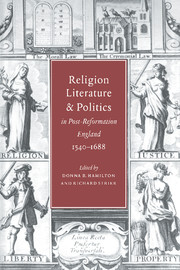Book contents
- Frontmatter
- Contents
- List of contributors
- Introduction
- 1 Sir John Oldcastle as symbol of Reformation historiography
- 2 The “sacred hunger of ambitious minds”: Spenser's savage religion
- 3 Subversive fathers and suffering subjects: Shakespeare and Christianity
- 4 Kneeling and the body politic
- 5 Donne and the politics of devotion
- 6 Catholic, Anglican or puritan? Edward Sackville, fourth Earl of Dorset, and the ambiguities of religion in early Stuart England
- 7 Crucifixion or apocalypse? Refiguring the Eikon Basilike
- 8 Marvell, sacrilege, and Protestant historiography: contextualizing “Upon Appleton House”
- 9 Entering The Temple: women, reading, and devotion in seventeenth-century England
- 10 Contextualizing Dryden's Absalom: William Lawrence, the laws of marriage, and the case for King Monmouth
- 11 Reformation in the Restoration Crisis, 1679–1682
- 12 Shadwell's dramatic trimming
- Index
1 - Sir John Oldcastle as symbol of Reformation historiography
Published online by Cambridge University Press: 16 October 2009
- Frontmatter
- Contents
- List of contributors
- Introduction
- 1 Sir John Oldcastle as symbol of Reformation historiography
- 2 The “sacred hunger of ambitious minds”: Spenser's savage religion
- 3 Subversive fathers and suffering subjects: Shakespeare and Christianity
- 4 Kneeling and the body politic
- 5 Donne and the politics of devotion
- 6 Catholic, Anglican or puritan? Edward Sackville, fourth Earl of Dorset, and the ambiguities of religion in early Stuart England
- 7 Crucifixion or apocalypse? Refiguring the Eikon Basilike
- 8 Marvell, sacrilege, and Protestant historiography: contextualizing “Upon Appleton House”
- 9 Entering The Temple: women, reading, and devotion in seventeenth-century England
- 10 Contextualizing Dryden's Absalom: William Lawrence, the laws of marriage, and the case for King Monmouth
- 11 Reformation in the Restoration Crisis, 1679–1682
- 12 Shadwell's dramatic trimming
- Index
Summary
In 1544 John Bale, whose efforts on behalf of the survival and transmission of English historical records are themselves legendary, attempted to rewrite one of the legends of the “proto-reformation” of the early fifteenth century. He published a revisionary account of the 1413 examination for heresy of Sir John Oldcastle, the Lollard knight, the first definitive event of the reign of Henry V; of the armed rebellion that Oldcastle may or may not have led in 1414; and of his eventual execution, burned hanging in chains, in December 1417. In the preface to this work Bale introduced an appeal for a new English historiography:
I wold wyshe some learned Englyshe man … to set forth the inglish chronicles in their right shappe, as certain other landes hath done afore them al affections set a part. I can not think a more necessarye thing to be laboured to the honour of God, bewty of the realme, erudicion of the people and commodite of other landes, nexte the sacred scripturs of the bible, than that worke wold be.
(A5v)John Bale himself wrote from exile during Henry VIII's reign, and in explicit continuance of the work of Tyndale, who seems to have been responsible for the publication of a little Boke of thorpe or Oldecastelle, published in 1530, and condemned by Archbishop Warham and John Stokesley, bishop of London, in 1531.
- Type
- Chapter
- Information
- Publisher: Cambridge University PressPrint publication year: 1996
- 3
- Cited by



